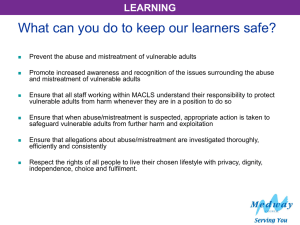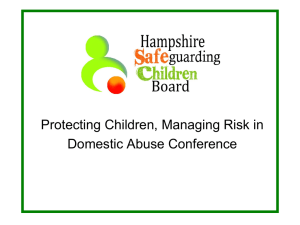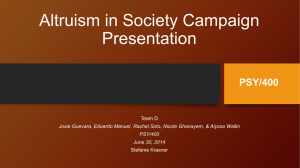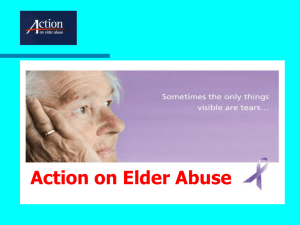Safeguarding Adults Awareness Presentation
advertisement
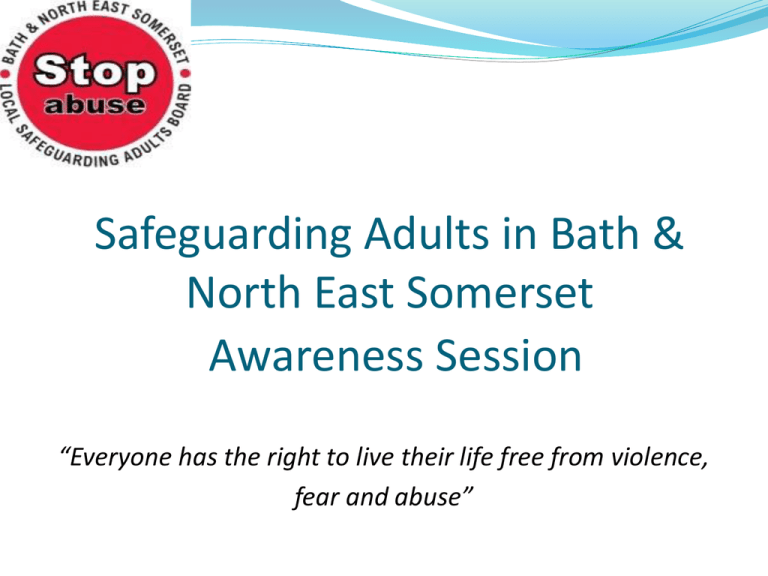
Safeguarding Adults in Bath & North East Somerset Awareness Session “Everyone has the right to live their life free from violence, fear and abuse” Aims and objectives By the end of this session you should be able to: Recognise an adult who may be vulnerable to being abused (an ‘adult at risk’) Recognise evidence and indicators of abuse Recognise factors which may increase the risk of abuse Know how to report concerns about abuse using appropriate systems Work in a manner that minimises the risk of adults at risk being abused Key Points Every individual has the right to a life free from abuse ‘Zero tolerance’ of abuse Safeguarding Adults is everyone’s responsibility Good multi-agency working is essential (B&NES Local Safeguarding Adults Board oversees this) However… all adults have the right to independence that involves a degree of risk (personal choice) … so Safeguarding Adults is different from Safeguarding Children Who is an “adult at risk” (sometimes known as a “vulnerable adult”)? “Somebody over the age of 18 who is receiving care services - or might be entitled to care services AND who is / may be unable to protect him or herself against significant harm or exploitation.” Discussion: Who do you work with who might fit this description? Who could be an “adult at risk”? Could be: A person with a disability / physical impairment A person with a learning difficulty A person with mental health needs A person with sensory impairments A person who have suffered a head injury A person who misuses substances and alcohol What types of abuse are there? Physical Sexual Psychological Financial/material Neglect Discriminatory Institutional Adults at risk may be abused in a number of ways within the same relationship, setting or incident People who may abuse Paid staff Family members Volunteers Neighbours, friends or others in the adult at risk’s network Strangers Abuse may also occur between adults at risk themselves What are the signs of possible abuse? These could include: A direct or indirect disclosure Changes in behaviour Withdrawal Fear of going home Unexplained bruises Money or possessions going missing Inappropriate comments Behaviour of other people – staff member / family / carer etc (NB This is not a comprehensive list) What should you do? (1) Listen to any disclosure carefully Stay calm / try not to show any shock / reassure the person Record carefully what has happened or been said Do not mistake secrecy for confidentiality Make sure the person is safe and the risk of any further abuse prevented. Call 999 for emergency help if necessary Call the police if there is evidence that a crime has been committed Don’t ‘prompt’ or seek more information than absolutely necessary What should you do? (2) Keep any evidence safe - ensure that it is not ‘contaminated’ (eg clothing should not be washed, fingerprints retained etc) Tell the adult at risk what will happen next Consider - are there any other people (including children) at risk? Inform your manager straight away Contact the Community Health & Social Care Access Team (01225 396000) or the Emergency Duty Team if out of hours (01454 615615) immediately (Where appropriate) complete an adverse incident form Seek out support you need for yourself Safeguarding Adult Investigations Normally led by social worker or police You may need to provide information at a ‘strategy meeting’ or ‘planning meeting’ Always be objective – be clear what is fact and what is your opinion Good record keeping important Local statistics (B&NES) 2010 – 2011: 300+ Safeguarding Adults concerns recorded Main reasons for referral: - Emotional / psychological abuse - Financial abuse - Physical abuse - Neglect Largest group of perpetrators – paid professional care staff followed by family members Mental Capacity Act 2005 The MCA exists to protect the rights of people who may not be able to make their own decisions, due to a brain injury / stroke / learning disability etc 5 key principles: - A presumption of mental capacity - The right for individuals to be supported to make their own decisions - The individual retains the right to make “eccentric or unwise” choices - All decisions should be made in the person’s best interest - Using the least restrictive intervention MCA 2005 continued “Every effort should be made to find ways of communicating with someone before deciding that they lack capacity to make a decision.” “If someone has been assessed as lacking capacity, any action taken, or decision made, on their behalf must be made in his/her best interests.” An Independent Mental Capacity Advocate (IMCA) can be appointed to help make important decisions Remember: It is not your responsibility to decide whether an adult at risk is being abused It is your responsibility to report abuse of an adult at risk if you have any concerns Safeguarding adults from abuse is everyone’s business Please do not ignore your concerns and let the abuse of an adult at risk continue Don’t forget to apply the MCA principles Contact details Immediate Risk: 999 Social Care Access Team (office hours) Tel. 01225 396000 Emergency Duty Team (out of hours) Tel. 01454 615615 For further advice: Contact the Safeguarding Lead for your agency Tel:

